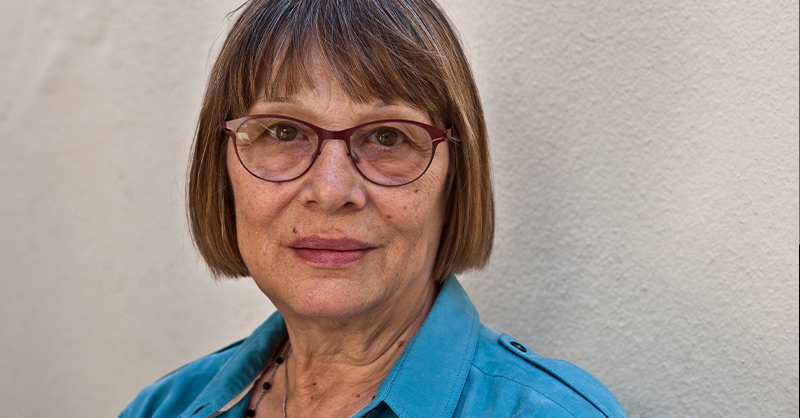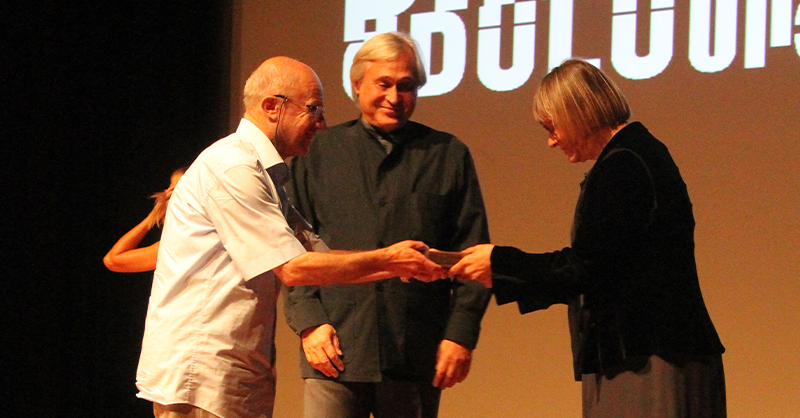
NATAŠA KANDIC, was born in 1946, in Yugoslavia, Kragujevac, a city of Serbia. She graduated from the Department of Sociology at Belgrade University in 1972. While working as a social services specialist, she chose to work as a lawyer.
Since the start of the Yugoslav wars in the early 1990s, she has documented war crimes committed between 1991 and 1999. During the war in Bosnia, she crossed the front lines to document the acts of Serbian forces against non-Serbian civilians in towns they occupied. Her efforts have alienated many in Serbia who remain reluctant to acknowledge the crimes Serbian forces committed during the wars of the former Yugoslavia, and even pro-democracy forces. Throughout the war in Kosovo, she travelled back and forth across Serbia, providing information to the outside world about human rights violations committed by police and paramilitary groups.
In 1992, she founded the Humanitarian Law Center (HLC) in Belgrade to document human rights violations in armed conflicts across the former Yugoslavia. The center continues to search for witnesses and information, and to offer legal assistance and support to victims of human rights violations.
In 1998, under increased Serbian oppression, the HLC office in Pristina published a report on human rights violations in Kosovo that was in direct contrast to information disseminated by the Serbian authorities. The evidence she gathered was later used in the preparation of indictments by the International Criminal Tribunal for the Former Yugoslavia. Most notably, she provided a video of the execution of six Bosnian Muslim prisoners near Trnovo, which was used as proof of the Srebrenica Massacre, during which more than 7,500 Bosnian Muslim men and boys were killed.
When the HLC, in a report published in 2012, accused Dikovic of a number of war crimes committed in Kosovo, during the time when he served as the commander of the Motorized Brigade of the Yugoslav Army, Ljubiša Dikovic, who since had rised through the ranks to become Chief-of-the- General-Staff, filed a lawsuit against her. The Ljubiša Dikovic File has reopened the issue of war crimes in Serbia. All those who rose in defense of Dikovic acknowledged that horrible crimes had been committed in Kosovo by the police and the army. This was the first time that no one denied the crimes, or equated the responsibility of all sides in the conflict.
Her fact-finding missions into wartime atrocities has garnered both hatred from amongst the Serbian ruling elite and nationalist groups, and praise from the international community. She has never given up seeking out the truth, even when undesirable to most. She continues to struggle to bind up the wounds of war

Just now, when I was listening to the ladies who just spoke... Until now, I had the opportunity to contact and interview hundreds, maybe thousands of ladies, mothers and sisters. I pictured them in my mind at this very moment. Without a doubt, it is the greatest pain –for a mother, for a father- on earth not to be able to find the body of one’s child; let alone the body, not to be able to get hold of a bone fragment.
In a meeting, when I was interviewing the parents of disappeared children, the words of one father caught me unawares, left me without words. When you looked at his face, you could see an expression of happiness. He told me this: “I found my son. I wish the same to you, to mothers and fathers. I wish you may find your children.” He had found the bones of his child. To find the bones of one’s dead or murdered child is close to finding where she or he is, to locating him or her. Now he or she has a grave, has a place. A mother or father could go there, lay flowers, remember his/her child, keep his/her memory alive. At least, she / he has a place now.
Mothers or fathers, or others who have missing relatives; how can they find them? It is a hard process to be sure, but there’s only one way to it: find the mass graves. How were these mass graves discovered, or how were these young people, these young bodies murdered, in which way were they slaughtered?
This Hrant Dink Award is for me an occasion of honor and dignity. This award comes to me from a country that is near to mine. In these countries of ours, or to put it more generally, in our area, there is one thing that I encounter only rarely, if at all; that is an award. Usually awards come from USA or from Europe. So thank you for this award. While I was reading articles on Hrant Dink, keeping up with the news and while I was following the work of this foundation, two important features caught my attention: struggle against racism and approaching the “Others” with empathy. I can define racism as such: “The worst and most efficient weapon against human dignity.” Despite twenty years that passed since then, my memories remain etched in my brain, in me. Especially a memory of mine from Bosnia-Herzegovina border... there was only one thing that I could see on that border: how human dignity was murdered. As you know, until the 90’s, we the Serbians, Bosnians, Croats and Muslims used to live in one country. During the war, these peoples became unfortunately enemies. I humbly tried my best to change things. It was incredibly difficult.
In 1993, about an incident along that border; I made a decision, almost a promise to myself and said: “This needs to end. I have to stop this, this racism, this otherization, this humiliation of people, this trampling of human dignity.” Humbly, with my own resources. I tried to help a group of Muslims to cross over from Serbia to Bosnia, to their country. It was 1993. They worked in Serbia, before the war, these Muslims from Bosnia, the war caught them in Serbia. At that time, Serbians controlled the border checkpoint. The policemen stopped us there. Their words killed almost everything in me in the name of humanity, because they played with peoples’ dignity. They told the Bosnian Muslims: “You are Turks. We don’t let Turks in. Also, we don’t let Serbian trash, Serbian garbage in.” I felt angry at that time, even more than angry, I felt rage. That’s it, in one word: rage. But when I read the fear from the Bosnian Muslims’ eyes, I started screaming. Then the chief police officer came onto me, with a gun in his hand. My Muslim friends were crying, I was screaming in rage. And I was content with the hand that fate dealt me. Come what may... Then, suddenly a young policeman came out. He almost pulled me by hand and pushed me towards the Muslims. They held me. If you wonder what I felt then... The only thing I felt was peace. I was safe next to Muslims. Then, I was really content with the hand that fate dealt me. Come what may; I wasn’t even afraid of death. This is a short story of mine, if I could only say it ended happily...
Those Muslims had only half an hour. They were on the way to see their families. In only half an hour, they could see their families, their spouses, their children and they had to leave after that. This is when I saw the ugly, bitter face of war.
If you allow me, I have only a few things left to say. Without empathy, without bridges between us, there is no peace and no reconciliation. When I say peace, when I say making peace; it is to make peace with our past, with our own responsibility and with other people. In my country and in the Balkans, most of our artists tried to answer with art, some doing theater and others with other branches of art. Their answer is: to build empathy, to build bridges, to build peace. Our artists, our people are our real supporters. Who are we, then? With whomever we resisted, with whomever we embarked on this road most enthusiastically, without otherizing each other’s people, without saying “the Other.” In the post-war era, to see face-to-face, eye-to-eye with all of our pain, to realize the truth of this pain and to erase the pains of war, to leave its ugly face far behind... the artists say: “There is only one prerequisite for peace and reconciliation: to empathize.” Me and people similar to me, more than two thousand people organized in various NGOs in ex-Yugoslavian Republic, say this: “Yes, let there be bridges of empathy. Yes, but we still need to find and name these 130.000 people who fell during this last war.”
Here in Turkey, you are trying to name your disappeared, your dead. By saying “name”: to find them, to collect evidence as to their circumstances of death, to continue looking for the missing ones. This is what lays at the very foundation of this award.
Thank you all.
